On this Day in History ... 30th December
30 Dec is in December.
Events on the 30th December
On 30 Dec 987 Robert "Pious" II King France (age 15) was crowned II King France: Capet.
On 30 Dec 1389 John Hastings 3rd Earl Pembroke (age 17) was killed in a tournament during the Christmas Court at Woodstock Palace, Oxfordshire [Map]. He was struck in the groin by the lance of Sir John Des. Earl Pembroke and Baron Manny extinct.
John Hastings 6th Baron Hastings (age 61) de jure 6th Baron Hastings. His claim was contested by Reginald Grey 3rd Baron Grey Ruthyn (age 27) who was the son of Elizabeth Hastings Baroness Grey Ruthyn daughter of John Hastings 13th Baron Bergavenny 1st Baron Hastings his case being that he was of the full blood whereas John Hastings 6th Baron Hastings (age 61) was of the half-blood ie Reginald Grey 3rd Baron Grey Ruthyn (age 27), like John Hastings 3rd Earl Pembroke (age 17), was descended from John Hastings 13th Baron Bergavenny 1st Baron Hastings and Isabel Valence Baroness Bergavenny Baroness Hastings, whereas John Hastings 6th Baron Hastings (age 61) was descended from John Hastings 13th Baron Bergavenny 1st Baron Hastings and Isabel Despencer Baroness Hastings and Bergavenny.



On 30 Dec 1436 Louis Wittelsbach III Elector Palatine (age 58) died at Heidelburg.
Chronicle of Gregory 1461. Then come tydyngys of the comynge of þea Erle of Marche (age 18) unto London; then alle the cytte were fayne, and thonkyd God, and said that
He that had Londyn for sake
Wolde no more to them take,
and said, "Lette us walke in a newe wyne yerde, and lette us make us a gay gardon in the monythe of Marche with this fayre whyte ros and herbe, the Erle of Marche (age 18)." And the Erle of Warwycke (age 32) mette with the Erle of Marche by-syde Oxforde, x myle out of hit, at a towne of his owne i-namyd Burford a-pon the Wolde [Map]; for the Erle of Marche come fro Walys, and was full sore a-ferde of the loste of the ij fyldys that were loste by-fore, Wakefylde that one, and Synt Albonys that othyr, and he sorowde sore for his fadyr the Duke of Yorke (age 49), and for his good brother the Erle of Rutlond (age 17), and for alle othyr lordys and comyns, &c.


Note a. the repeated in MS.
Chronicle of England by William of Worcester. On the 29th of December1, at Wakefield, while the soldiers of the Duke of York (age 49) were wandering through the country seeking provisions, a dreadful battle occurred between the said Duke of Somerset (age 24), the Earl of Northumberland (age 39), and Lord Neville (age 50) with a large army, and the opposing party, where the Duke of York (age 49), Thomas Neville (age 30), son of the Earl of Salisbury (age 60), Thomas Harington (age 60), Thomas Parr, Edward Bourchier, James Pickering, and Henry Radford, as well as many other knights and esquires, and about two thousand commoners, were killed on the field. In the retreat after the battle, Lord CliffordLord Edmund, Earl of Rutland (age 17), son of the Duke of York (age 49), on the bridge at Wakefield [Map]. And on the same night, the Earl of Salisbury (age 60) was captured by the servant of Andrew Trollope. On the next day, at Pontefract, the Bastard of Exeter killed the said Earl of Salisbury (age 60), where, by the counsel of the lords, the lifeless bodies of the Duke of York, the Earl of Salisbury, and Rutland, Thomas Neville, Edward Bowcher, Thomas Harington, Thomas Parre, James Pykeryng, and John Harrowe of London, mercer, were beheaded, and their heads were placed on various parts of York. They crowned the head of the Duke of York with a paper crown in mockery.





xxix. die mensis Decembris apud Wakfelde, gentibus ducis Eborum vagantibus per patriam pro victualibus quærendis, factum est execrabile bellum inter dictum ducem Somercetiæ, comitem Northumbriæ ac dominum Nevylle cum magno exercitu et partem aliam; ubi occubuerunt in campo dux Eboracensis, Thomas Nevil, filius comitis Sarum, Thomas Haryngtone, Thomas Parre, Edwardus Bowcher, Jacobus Pykeryng, et Henricus Rathforde, ac etiam multi alii milites et armigeri, et plebs ad duo millia. Et in fugiendo post campum super pontem apud Wakefelde dominus de Clyfforde occidit dominum Edmundum, comitem de Rutlande, filium ducis Eboraci. Et eadem nocte comes Sarum captus est per servientem Andreæ Trolloppe. Et in crastino apud Pountfrett bastardus Exoniæ occidit dictum comitem Sarum, ubi per consilium dominorum decollaverunt corpora mortua ducis Eboracensis, et comitis Sarum et Ruttland, Thomas Nevyle, Edwardi Boucher, Thomas Haryngton, Thomæ Parre, Jacobi Pykeryng, et Johannis Harrowe de London, mercer, posueruntque capita eorum super diversas partes Eboraci. Caput quoque ducis Eboraci in despectu coronaverunt carta.
Note. The Battle of Wakefield took place on the 30th of December 1460.
On 30 Dec 1460 the Lancastrian army took their revenge for the defeats of the First Battle of St Albans and the Battle of Northampton during the Battle of Wakefield at Sandal Castle [Map]. The Lancastrian army was commanded by Henry Holland 3rd Duke Exeter (age 30), Henry Beaufort 2nd or 3rd Duke of Somerset (age 24) and Henry Percy 3rd Earl of Northumberland (age 39), and included John Courtenay 15th Earl Devon (age 25) and William Gascoigne XIII (age 30), both knighted, and James Butler 1st Earl Wiltshire 5th Earl Ormonde (age 40), John "Butcher" Clifford 9th Baron Clifford (age 25), John Neville 1st Baron Neville of Raby (age 50), Thomas Ros 9th Baron Ros Helmsley (age 33), Henry Roos and Thomas St Leger (age 20).







The Yorkist army was heavily defeated.
Richard Plantagenet 3rd Duke of York (age 49) was killed. His son King Edward IV of England (age 18) succeeded 4th Duke York, 7th Richard Plantagenet 3rd Duke of York (age 49), 9th Earl Ulster, 3rd Earl Cambridge.

Thomas Neville (age 30), and Edward Bourchier were killed.

Father and son Thomas Harrington (age 60) and John Harrington (age 36) were killed, the former dying of his wounds the day after.
William Bonville 6th Baron Harington (age 18) was killed. His daughter Cecily Bonville Marchioness Dorset succeeded 7th Baroness Harington.
Thomas Parr (age 53) fought in the Yorkist army.
Following the battle Richard Neville Earl Salisbury (age 60) was beheaded by Thomas "Bastard of Exeter" Holland. William Bonville (age 40) was executed.

Edmund York 1st Earl of Rutland (age 17) was killed on Wakefield Bridge [Map] by John "Butcher" Clifford (age 25) by which he gained his sobriquet "Butcher". Earl of Rutland extinct.

Chronicle of Gregory 1460. 30 Dec 1460. Ande the same year, the xxx [30] day of December, the Duke of Exceter (age 30), the Duke of Somersett (age 24), the Erle of Northehomberlond (age 39), the Lord Roos (age 33), the Lord Nevyle (age 50), the Lord ClyfForde (age 25), with many mo lordys, knyghtys, squyers, and gentyllys, and the commyns of the Quenys party, met with the Duke of Yorke (age 49) at Wakefylde [Map], and there they made a grete jorney a-pon the lord and Duke of Yorke, and toke him and the Erle of Saulysbury (age 60), the Erle of Rutlond (age 17), and the Lord Haryngdon (age 18), and Syr Thomas Nevyle (age 30), and Syr Thomas Haryngdon (age 60), and many mo knyghtys were take a slayne by syde alle the comyns. But this good Duke of Yorke with his lordys a-fore said loste her heddys; God have marcy on there soulys, for they loste in that jorneys the nombyr of xxvc [2500] men. And in the Quenys party were slay but ii c [200] men, &c.







Chronicle of England by Jean de Waurin. Chapter 3.40. How the Duke of York and the Earl of Salisbury were defeated and killed through the treachery of Andrew Trollope and several other noble men.
The Duke of York, therefore, being retreated to Wakefield, upon hearing news that Queen Margaret was coming with a great force of armed men to fight him, accompanied by the Duke of Somerset, was greatly astonished, as he did not have sufficient troops at the moment to resist such great power. He and the Earl of Salisbury, along with others in their company, spoke together to conclude their affairs. They sent for men from all sides, fortifying themselves to the best of their ability within the town. However, all this was in vain because at the moment they were attacked, most of their men had gone out for foraging. Additionally, Andrew Trollope, who was a very cunning military man, told the Duke of Somerset that he knew well that they could not force the Duke of York out of the town without a great loss of men. He found a way throughout the night to dress his men in coats bearing the badge of the Ragged Staff, which belonged to the Earl of Warwick (age 33) and were recognized as such, thus they appeared to be four hundred of the bravest men, well-instructed in what they had to do secretly. Their plan was to go straight to the town and tell the Duke of York that they came from the county of Lancashire to aid him.
When the Duke of York, who never suspected treachery, saw these companions approaching, he was very joyful and allowed them inside the town. That same night, the Duke of York ordered a strong guard because he knew well that the Duke of Somerset was in the fields, intending to confront him with all his might.
But when day broke, Andrew Trollope, accompanied by other soldiers all wearing the badge of the Ragged Staff, sent word to the Duke of York, without revealing his identity, that they were a large force come to his aid. The Duke was overjoyed and marched out of the town with the intention of engaging his enemies. At that moment, Andrew Trollope, the traitor, knowing that the Duke of Somerset was nearby, initiated the skirmish, and the Duke of Somerset, ready for action, charged fiercely upon the Duke of York and his men. Quickly, Andrew Trollope and his group, as well as those who had been sent by him into the town that night, turned against the Duke of York and his followers. In this battle, the Duke of York, the Earl of Rutland his son, the Earl of Salisbury, Sir Thomas Neville his son, and many other noble men of their company were killed. This battle took place outside the town of Wakefield on the penultimate day of December in the year fourteen sixty. Queen Margaret was very joyful upon hearing this news, as were all those supporting her cause. On the other hand, the Earls of March and Warwick, who had lost their fathers in this battle, were deeply saddened and angered, but for the time being, they could not rectify the situation.

Croyland Chronicle. 30 Dec 1461. After the conclusion of these matters, towards the close of the same year, it being the week of our Lord's Nativity, the said Richard, duke of York, incautiously engaged the northern army at Wakefield which was fighting for the king, without waiting to bring up the whole of his own forces ; upon which, a charge was made by the enemy on his men, and he was without any mercy or respect relentlessly slain. There fell with him at the same place many noble and illustrious men ; and countless numbers of the common people, who had followed him, met their deaths there, and all to no purpose.
Letters and Papers 1535. 30 Dec 1535. 1036. After I had taken leave of the King he recalled me by the Duke of Suffolk (age 51) to tell me news had just come that the Queen (age 50) was in extremis, and that I should hardly find her alive; moreover, that this would take away all the difficulties between your Majesty and him. I think the danger cannot be so great, because the physician did not represent the case to me as so urgent; nevertheless I took horse at once. I asked leave that the Princess (age 19) might see the Queen (age 50) her mother,—which he at first refused, and on my making some remonstrance he said he would take advice on the subject.

The Princess had advised me to make this request. London, 30 Dec. 1535.
Fr., from a modern copy, pp. 6.
On 30 Dec 1546 Henry VIII (age 55) made his last revision to his will signed using the Dry Stamp that was used increasingly commonly. The will confirmed the succession as King Edward VI of England and Ireland (age 9), Queen Mary I of England and Ireland (age 30) and Queen Elizabeth I of England and Ireland (age 13).
The will appointed sixteen executors: Anthony Browne (age 46), Archbishop Thomas Cranmer (age 57), Anthony Denny (age 45), John Dudley 1st Duke Northumberland (age 42), William Herbert 1st Earl Pembroke (age 45), Edward Montagu (age 61), Edward North 1st Baron North (age 50), William Paget 1st Baron Paget Beaudasert (age 40), William Paulet 1st Marquess Winchester (age 63), John Russell 1st Earl Bedford (age 61), Edward Seymour 1st Duke of Somerset (age 46), Bishop Cuthbert Tunstall (age 72) and Thomas Wriothesley 1st Earl of Southampton (age 41).







On 30 Dec 1623 the fourth Parliament of James I (age 57) known as the Happy Parliament was summoned.
On 19 Feb 1624 the Happy Parliament held its first session.
Roland Egerton 1st Baronet (age 29) was elected MP Wootton Bassett.
Arthur Lake (age 25) was elected MP Minehead.
James Wriothesley (age 18) was elected MP Winchester.
Richard Edgecumbe (age 53) was elected MP Grampound.
Evelyn's Diary. 30 Dec 1640. I saw his Majesty (age 40) (coming from his Northern Expedition) ride in pomp and a kind of ovation, with all the marks of a happy peace, restored to the affections of his people, being conducted through London with a most splendid cavalcade; and on the 3d of November following (a day never to be mentioned without a curse), to that long ungrateful, foolish, and fatal Parliament, the beginning of all our sorrows for twenty years after, and the period of the most happy monarch in the world: Quis talia fando!
Pepy's Diary. 30 Dec 1662. Thence to White Hall, where I carried my wife to see the Queen (age 53) in her presence-chamber; and the maydes of honour and the young Duke of Monmouth (age 13) playing at cards. Some of them, and but a few, were very pretty; though all well dressed in velvet gowns.
Pepy's Diary. 30 Dec 1663. So leaving him at the Guiny House I to the Coffee House, whither came Mr. Grant (age 43) and Sir W. Petty (age 40), with whom I talked, and so did many, almost all the house there, about his new vessel, wherein he did give me such satisfaction in every point that I am almost confident she will prove an admirable invention.
On 30 Dec 1665 Robert Cawdron died. Memorial at Church of St John the Baptist, Great Hale [Map]
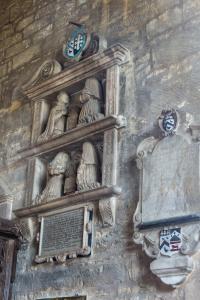
Pepy's Diary. 30 Dec 1667. Thence to White Hall, and there to visit Sir G. Carteret (age 57), and there was with him a great while, and my Lady and they seem in very good humour, but by and by Sir G. Carteret (age 57) and I alone, and there we did talk of the ruinous condition we are in, the King (age 37) being going to put out of the Council so many able men; such as my Lord Anglesey (age 53), Ashly (age 46), Hollis (age 68), Secretary Morrice (age 65) (to bring in Mr. Trevor), and the Archbishop of Canterbury (age 69), and my Lord Bridgewater (age 44). He tells me that this is true, only the Duke of York (age 34) do endeavour to hinder it, and the Duke of York (age 34) himself did tell him so: that the King (age 37) and the Duke of York (age 34) do not in company disagree, but are friendly; but that there is a core in their hearts, he doubts, which is not to be easily removed; for these men do suffer only for their constancy to the Chancellor (age 58), or at least from the King's ill-will against him: that they do now all they can to vilify the clergy, and do accuse Rochester, Kent [Map] [Dolben]... and so do raise scandals, all that is possible, against other of the Bishops. He do suggest that something is intended for the Duke of Monmouth (age 18), and it may be, against the Queene (age 58) also: that we are in no manner sure against an invasion the next year: that the Duke of Buckingham (age 39) do rule all now, and the Duke of York (age 34) comes indeed to the Caball, but signifies little there. That this new faction do not endure, nor the King (age 37), Sir W. Coventry (age 39); but yet that he is so usefull that they cannot be without him; but that he is not now called to the Caball. That my Lord of Buckingham (age 39), Bristoll (age 55), and Arlington (age 49), do seem to agree in these things; but that they do not in their hearts trust one another, but do drive several ways, all of them. In short, he do bless himself that he is no more concerned in matters now; and the hopes he hath of being at liberty, when his accounts are over, to retire into the country. That he do give over the Kingdom for wholly lost. So after some other little discourse, I away, meeting with Mr. Cooling. I with him by coach to the Wardrobe, where I never was since the fire in Hatton Garden [Map], but did not 'light: and he tells me he fears that my Lord Sandwich (age 42) will suffer much by Mr. Townsend's being untrue to him, he being now unable to give the Commissioners of the Treasury an account of his money received by many thousands of pounds, which I am troubled for.









On 30 Dec 1722 Charles Yorke was born to Philip Yorke 1st Earl of Hardwicke (age 32) and Margaret Cocks Countess Hardwicke.
On 30 Dec 1731 Fulbeck Hall was mostly destroyed in a fire. It was rebuilt the following year.
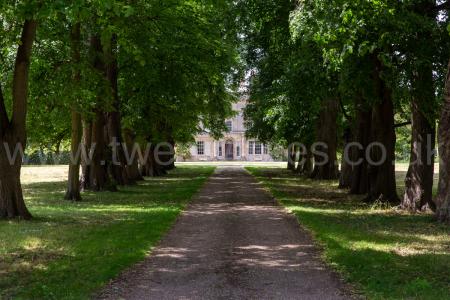
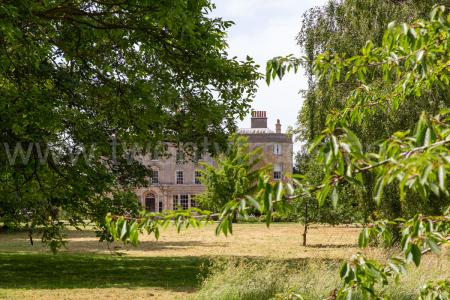
On 30 Dec 1797 David Martin (age 60) died.
1911 Encyclopædia Britannica. [Percy Bysshe Shelley] The death of Harriet having removed the only obstacle to a marriage with Mary Godwin (age 19), the wedding ensued on the 30th of December 1816, and the married couple settled down at Great Marlow in Buckinghamshire.
On 30 Dec 1820 Agneta Johnson (age 80) died. Buried at St Andrew's Church, Wimpole [Map].
Inscription tablet flanked by pilasters with figures of her husband in robes of state and of two sons, and with medallion portrait at the head, all in white marble, signed 'J. FLAXMAN (age 65), R.A. Sculptor'
Agneta Johnson: On 11 Nov 1740 she was born to Henry Johnson of Berkhamstead in Hertfordshire. On 30 Dec 1762 Charles Yorke and she were married. He the son of Philip Yorke 1st Earl of Hardwicke and Margaret Cocks Countess Hardwicke.
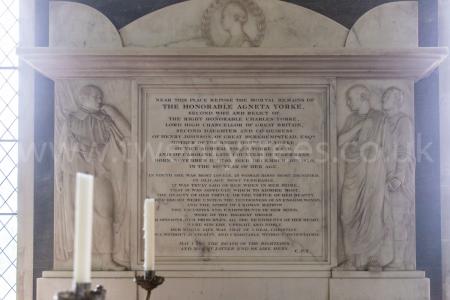
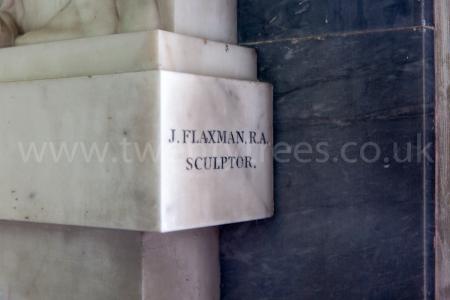
On 30 Dec 1821 Joseph Farington (age 74) died.
On 30 Dec 1830 Elizabeth Mary Browne (age 63) died. Monument sculpted by Francis Leggatt Chantrey (age 49) in St Mary's Church Easebourne Midhurst [Map].
Elizabeth Mary Browne:
On 05 Dec 1767 she was born to Anthony Joseph Browne 7th Viscount Montagu and Frances Falconer Mackworth Viscountess Montague. On 01 Sep 1794 William Stephen Poyntz and she were married.
On 01 Sep 1794 William Stephen Poyntz and she were married.

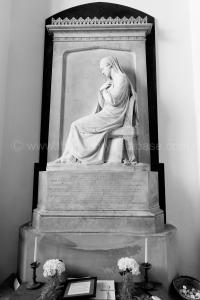
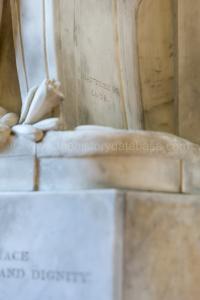
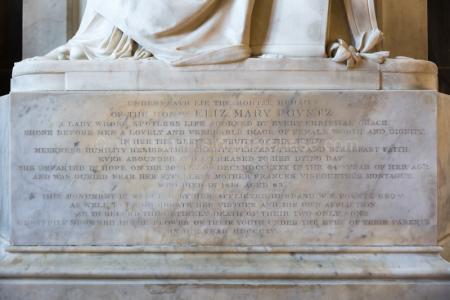
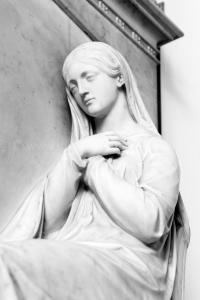
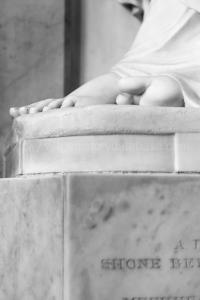
On 30 Dec 1839 William Hilton (age 53) died. Monument at Lincoln Cathedral [Map].
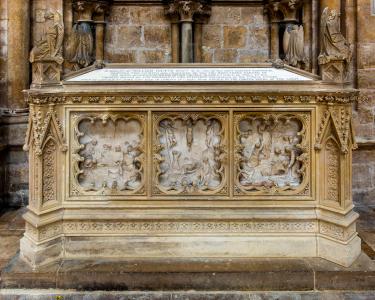
The Diary of George Price Boyce 1851. 30 Dec 1851. Called for John Seddon (age 24) at 10 0'clock, who accompanied me to St. Paul's Cathedral to witness Turner's (deceased) funeral. We first looked over the Cathedral and criticised the wretched taste of the greater part of the monuments, one by Behnes (age 56) seemed to be almost the only one that was simple, grand, and characteristic. The mourners, consisting of the Members of the Royal Academy and manv personal friends, alighted at the west entrance and advanced slowly to the choir preceded by the choristers, etc. Seddon (age 24) and I obtained a central place in the choir, close to the coffn. The beautiful and awe-striking service for the dead was then gone through, its influence being much augmented by the sublimity of the scene. The body was then conveyed into the vaults, followed by the mourners. Father, who had brought Joanna, bought a ticket which admitted us all three into the vaults. I remained to see the stone rolled over him and to assist in adjusting the same—they first threw a basket full of human bones on and beside the coffn before rolling the stone over it. It was placed between the resting places of James Barry, the painter (next to which was that of Sir Joshua Reynolds), and Constantia, the great grand-daughter of Sir Christopher Wren, next to the tomb of Sir Christopher himself.
The Diary of George Price Boyce 1852. 30 Dec 1852. Went down to Dante G (age 24). and William Rossetti's chambers at 14 Chatham Place, Blackfriars Bridge. Met there Wells (age 24), J. P. Seddon (age 25), Clayton (age 25), and Mr. Munro (age 27), Mr. Stephens (age 25) and Mr. Hughes (age 20). Rossetti (age 24) showed me his studio but none of his works (which is his way). He had for our entertainment a series of anastatic drawings designed and coloured by the Hon. Mrs. Boyle, some of which as beautiful in feeling, natural simplicity, and colour, and in poetical treatment as almost anything I have seen. They illustrate a nursery rhyme. Also a quantity of Gavarni's works, and a grand and most striking mask of Dante taken from a caste of his face in death; a tracing of his head in Giotto's fresco with the eye imperfect; a pen and ink sketch by Millais from Keats' "Isabella." In the physical way, roast chestnuts and coffee, honey, and hot spirits. His room has a jolly balcony overhanging the river, the reflection of the lights on the bridge and quays, etc., were charming. Conversation throughout delightful, resulting methought from the happy and gentlemanly freedom of the company generally. There was only one of D. G. Rossetti's (age 24) works to be seen in the room, and that was a sketch, study of a man, back view. Gabriel Rossetti (age 24) invited me to his studio next Thursday.
On 30 Dec 1913 Queen Sophia of Sweden and Norway (age 77) died.
On 30 Dec 1915 the SS Persia was torpedoed near Crete without warning by the German U-boat U-38, commanded by Max Valentiner. It sank in five to ten minutes, killing 343 of the 519 aboard.
John Douglas-Scott-Montagu 2nd Baron Montagu of Beaulieu (age 49) survived. His mistress Eleanor Thornton (age 35) drowned.
On 30 Dec 1915 Eleanor Thornton (age 35) drowned during the Sinking of the SS Persia.
On 17 Dec 1930 William Everard Browne ffolkes 4th Baronet (age 69) died. His brother Francis Arthur Stanley ffolkes 5th Baronet (age 67) succeeded 5th Baronet ffolkes of Hillington Hall in Norfolk. On 30 Dec 1917 William Rupert Browne ffolkes was killed in action. Memorial in the Church of St Mary, Hillington [Map].
William Everard Browne ffolkes 4th Baronet: In 1861 he was born to Reverend Henry Edward Browne ffolkes. On 09 May 1912 William ffolkes 3rd Baronet died. His first cousin William Everard Browne ffolkes 4th Baronet succeeded 4th Baronet ffolkes of Hillington Hall in Norfolk.
Francis Arthur Stanley ffolkes 5th Baronet: On 08 Dec 1863 he was born to Reverend Henry Edward Browne ffolkes. On 18 Oct 1938 or 20 Oct 1938 Francis Arthur Stanley ffolkes 5th Baronet died. His son Edward John Patrick Boschetti ffolkes 6th Baronet succeeded 6th Baronet ffolkes of Hillington Hall in Norfolk.
William Rupert Browne ffolkes: he was born to William Everard Browne ffolkes 4th Baronet.
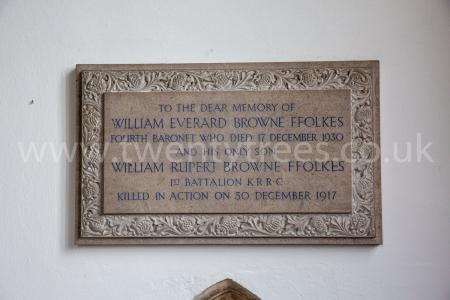
Births on the 30th December
On 30 Dec 1394 James "Black Knight of Lorn" Stewart was born to John Stewart of Innermeath 3rd of Lorn (age 44) and Isabel Macdougall at Innermeath.
On 30 Dec 1455 John Mordaunt was born to William Mordaunt (age 23) and Margaret Peake (age 21) at Turvey.
On 30 Dec 1578 Prince Ulrik Oldenburg was born to Frederick II King Denmark (age 44) and Sophie Mecklenburg-Schwerin Queen Consort Denmark (age 21).
On 30 Dec 1578 Thomas Cecil was born to Thomas Cecil 1st Earl Exeter (age 36) and Dorothy Neville Countess Exeter (age 30).

On 30 Dec 1607 James Harington 3rd Baronet was born to Edward Harington 2nd Baronet and Margaret Doyley (age 29).
On 30 Dec 1609 Roger Manners was born to George Manners (age 37) and Grace Pierrepont (age 34).

On 30 Dec 1631 Henry Fairfax 4th Lord Fairfax of Cameron was born to Henry Fairfax (age 46) and Mary Cholmley (age 38).
On 30 Dec 1637 William Cave Churchman was born to John Cave (age 47) at Pickwell, Leicestershire.
On 30 Dec 1654 Maria Anna Josepha Habsburg Spain was born to Ferdinand King Bohemia III Holy Roman Emperor (age 46) and Eleonora Gonzaga Queen Consort Bohemia (age 24). Coefficient of inbreeding 2.47%.
On 30 Dec 1655 Dorothy Fairfax was born to Henry Fairfax 4th Lord Fairfax of Cameron (age 24).
On 30 Dec 1663 Lady Elizabeth Carteret was born to Edouard Carteret Gentleman Usher (age 43) and Elizabeth Johnson. She was baptised at St Martin in the Fields [Map].
On 30 Dec 1684 Leopold Hesse-Kassel was born to Charles I Landgrave Hesse-Kassel (age 30) and Maria Amalia of Courland Landgravine Hesse-Kassel (age 31). Coefficient of inbreeding 6.66%.
On 30 Dec 1702 Marie Gabrièle Charlotte Lorraine was born to Leopold Duke of Lorraine (age 23) and Élisabeth Charlotte Bourbon Duchess Lorraine (age 26). She a great x 3 granddaughter of King James I of England and Ireland and VI of Scotland.
On 30 Dec 1715 Thomas Watson 3rd Earl Rockingham was born to Edward Watson (age 29) and Catherine Tufton (age 23).
After 30 Dec 1715 Katherine Watson was born to Edward Watson (age 29) and Catherine Tufton (age 23).
After 30 Dec 1715 Edward Watson was born to Edward Watson (age 29) and Catherine Tufton (age 23).
On 30 Dec 1722 Charles Yorke was born to Philip Yorke 1st Earl of Hardwicke (age 32) and Margaret Cocks Countess Hardwicke.
Around 1723 Thomas Thoroton was born to Robert Thoroton of Screveton and Mary Levett. He was educated at Westminster School [Map]. He was admitted to Trinity Hall, Cambridge University on 30 Dec 1741.
On 30 Dec 1741 James Sanderson 1st Baronet was born.
On 30 Dec 1752 Charles Warre Malet 1st Baronet was born.
On 30 Dec 1767 Frederick Patrick Townshend was born to George Townshend 1st Marquess Townshend (age 43) and Charlotte Compton 16th Baroness Ferrers Chartley 7th Baroness Compton.

On 30 Dec 1768 Mary Ricketts Countess of Northesk was born to Wiliam Henry Ricketts (age 32) and Mary Jervis (age 31).
On 30 Dec 1799 Thomas Grosvenor 2nd Earl Wilton was born to Robert Grosvenor 1st Marquess Westminster (age 32) and Eleanor Egerton Marchioness Westminster (age 29).

On 30 Dec 1801 Harry Dent Goring 8th Baronet was born to Charles Forster Goring 7th Baronet (age 33).
On 30 Dec 1806 Wilbraham Egerton 1st Baron Egerton Tatton was born to Wilbraham Egerton (age 25) and Elizabeth Sykes (age 29). Coefficient of inbreeding 3.12%.
On 30 Dec 1810 Archibald Seymour 13th Duke of Somerset was born to Edward Seymour 11th Duke of Somerset (age 35) and Charlotte Hamilton Duchess Somerset (age 38).

On 30 Dec 1824 Isabella Mansfield was born to John Mansfield.
On 30 Dec 1837 John Murray Mordaunt was born to John Mordaunt 9th Baronet (age 29).
On 30 Dec 1848 Ronald Campbell was born to John Frederick Vaughan Campbell 2nd Earl Cawdor (age 31) and Sarah Mary Compton Cavendish Countess Cawdor (age 35). He was educated at Eton College [Map].
On 30 Dec 1856 Christopher Pleydell-Bouverie was born to Jacob Pleydell-Bouverie 4th Earl Radnor (age 41) and Mary Augusta Frederica Grimston Countess Radnor (age 35).
On 30 Dec 1865 Rudyard Kipling was born to John Lockwood Kipling (age 28) and Alice Macdonald (age 28).
On 30 Dec 1865 Ralph Shirley was born to Walter Waddington Shirley (age 37).
On 30 Dec 1868 Major Robert Wentworth Doyne was born to Charles Mervyn Doyne (age 29) and Frances Mary Fitzwilliam (age 26).
On 30 Dec 1870 Charles Gordon-Lennox 8th Duke Richmond was born to Charles Gordon-Lennox 7th Duke Richmond (age 25) and Amy Mary Ricardo (age 23).
On 30 Dec 1884 Frederick Philip Champion de Crespigny 7th Baronet was born to Philip Augustus Champion de Crespigny (age 34).
On 30 Dec 1888 Edward Manners Nightingale 14th Baronet was born to Edward Henry Nightingale (age 32).
On 30 Dec 1892 Elizabeth Mary Shirley was born to Walter Shirley 11th Earl Ferrers (age 28) and Mary Jane Moon Countess Ferrers.
On 30 Dec 1893 Marjorie Ellinor Trotter Countess Fortescue was born to Charles William Trotter (age 28) and Eleanor Hamilton (age 28).
On 30 Dec 1894 Walter Scott 8th Duke Buccleuch 10th Duke Queensberry was born to John Scott 7th Duke Buccleuch 9th Duke Queensberry (age 30) and Margaret Alice "Molly" Bridgeman Duchess Buccleuch Duchess Queensbury (age 22).

On 30 Dec 1895 Henry Rainaud Gage 6th Viscount Gage was born to Henry Charles Gage 5th Viscount Gage (age 41).
On 30 Dec 1937 James Aubrey Watson 5th Baronet was born to Thomas Aubrey Watson 4th Baronet (age 26) and Ella Marguerite Farrar Lady Watson.
On 30 Dec 1937 Charles Evelyn Baring 2nd Baron Howick was born to Evelyn Baring 1st Baron Howick (age 34) and Mary Cecil Grey Baroness Howick Glendale (age 30).
On 30 Dec 1952 John Michael Edward Seymour 19th Duke of Somerset was born to Percy Hamilton Seymour 18th Duke of Somerset (age 42) and Gwendoline Collette Jane Thomas Duchess Somerset.
On 30 Dec 1958 Richard Leonard Vere Isham 15th Baronet was born to Norman Murray Crawford Isham 14th Baronet (age 28).
Marriages on the 30th December
On 30 Dec 1292 Henry Plantagenet 3rd Earl of Leicester 3rd Earl Lancaster (age 11) and Maud Chaworth (age 10) were married. He the son of Edmund "Crouchback" Plantagenet 1st Earl of Leicester 1st Earl Lancaster (age 47) and Blanche Capet Queen Navarre (age 44). He a grandson of King Henry III of England. 


After 30 Dec 1389 Richard Fitzalan 9th Earl of Surrey 11th Earl of Arundel (age 43) and Philippa Mortimer Countess Pembroke, Arundel and Surrey (age 14) were married. She by marriage Countess Arundel Sussex, Countess Surrey. The difference in their ages was 29 years. She the daughter of Edmund Mortimer 3rd Earl March, Earl Ulster and Philippa Plantagenet Countess March 5th Countess Ulster. He the son of Richard Fitzalan 10th Earl of Arundel 8th Earl of Surrey and Eleanor Plantagenet Countess Arundel and Surrey. They were first cousin twice removed. He a great x 2 grandson of King Henry III of England. She a great granddaughter of King Edward III of England. 



After 25 Jan 1433 and before 30 Dec 1448 Robert Ros (age 54) and Anne Halsham were married. He a great x 4 grandson of King Henry III of England. 
Before 30 Dec 1455 William Mordaunt (age 23) and Margaret Peake (age 21) were married.
Before 30 Dec 1563 Henry Tuchet 10th Baron Audley, 7th Baron Tuchet and Elizabeth Sneyd Baroness Audley Heighley were married.
On 30 Dec 1577 John Hamilton 1st Marquess Hamilton (age 42) and Margaret Lyon Marchioness Hamilton were married. She by marriage Marchioness Hamilton. He the son of James Hamilton 2nd Earl Arran and Margaret Douglas Duchess Châtellerault. They were second cousins.
Before 30 Dec 1600 George Lynne of Southwick Hall and Martha Throckmorton (age 49) were married. She a great x 5 granddaughter of King Edward III of England. 
Before 30 Dec 1631 Henry Fairfax (age 46) and Mary Cholmley (age 38) were married.
On 30 Dec 1656 Alexander Leslie 2nd Earl Leven (age 19) and Margaret Howard Countess Leven (age 21) were married. He the son of Alexander Leslie and Margaret Leslie Countess Buccleuch and Wemyss (age 36).


Before 30 Dec 1663 Edouard Carteret Gentleman Usher (age 43) and Elizabeth Johnson were married.
On 30 Dec 1669 Christopher Monck 2nd Duke Albemarle (age 16) and Elizabeth "Mad Duchess" Cavendish Duchess Albermarle Duchess of Montagu (age 15) were married at Whitehall Palace [Map]. She the daughter of Henry Cavendish 2nd Duke Newcastle upon Tyne (age 39) and Frances Pierrepont Duchess Newcastle upon Tyne (age 39). He the son of George Monck 1st Duke Albemarle (age 61) and Anne Clarges Duchess Albermarle (age 50). He a great x 4 grandson of King Edward IV of England. 


Before 30 Dec 1677 Charles North 1st Baron Grey, 5th Baron North (age 41) and Catherine Grey Baroness North and Grey of Rolleston (age 46) were married. She by marriage Baroness North, Baroness Grey of Rolleston.
On 30 Dec 1687 Wriothesley Baptist Noel 2nd Earl Gainsborough (age 26) and Catherine Greville Duchess Buckingham and Normandby were married. He the son of Edward Noel 1st Earl Gainsborough (age 46) and Elizabeth Wriothesley Countess Gainsborough (age 41).


On 30 Dec 1762 Charles Yorke (age 40) and Agneta Johnson (age 22) were married. He the son of Philip Yorke 1st Earl of Hardwicke (age 72) and Margaret Cocks Countess Hardwicke.
On 30 Dec 1766 Francis Burdett (age 23) and Eleanor Jones were married.
On 30 Dec 1776 Thomas Onslow 2nd Earl Onslow (age 22) and Arabella Mainwaring Ellerker Countess Onslow (age 21) were married. He the son of George Onslow 1st Earl Onslow (age 45) and Henrietta Shelley Countess Onslow (age 45).
On 30 Dec 1804 James Bruce Carstairs (age 34) and Andalusia Grant were married.
Before 30 Dec 1806 Wilbraham Egerton (age 25) and Elizabeth Sykes (age 29) were married. They were half first cousins.
On 30 Dec 1815 Henry Roper-Curzon 15th Baron Teynham (age 26) and Susan Harriet Bedingfield were married.
1911 Encyclopædia Britannica. [Percy Bysshe Shelley] The death of Harriet having removed the only obstacle to a marriage with Mary Godwin (age 19), the wedding ensued on the 30th of December 1816, and the married couple settled down at Great Marlow in Buckinghamshire.
On 30 Dec 1830 Edward Henry Cole and Mary Letitia Parnell were married.
On 30 Dec 1845 Charles Edward Kennaway (age 45) and Olivia Way were married.
On 30 Dec 1875 Maurice John George Ponsonby 4th Baron de Mauley (age 29) and Madeline Emily Augusta Hanbury-Tracy Baroness de Mauley were married.
On 30 Dec 1903 Constantine Phipps 3rd Marquess Normanby (age 57) and Gertrude Stansfeld Foster Marchioness Normanby were married. She by marriage Marchioness Normanby. He the son of George Phipps 2nd Marquess Normanby and Laura Russell Marchioness Normanby. He a great x 5 grandson of King James II of England Scotland and Ireland. 
On 30 Dec 1930 Henry George Orlando Bridgeman (age 48) and Joan Constable-Maxwell (age 29) were married. He the son of George Cecil Orlando Bridgeman 4th Earl Bradford and Ida Frances Annabella Lumley Countess Bradford (age 82).

Deaths on the 30th December
On 30 Dec 1115 Theodoric "Valiant" Metz II Duke Lorraine (age 60) died. His son Simon Metz I Duke Lorraine (age 39) succeeded I Duke Lorraine. Adelaide Reginar Duchess Lorraine by marriage Duchess Lorraine.
On 30 Dec 1255 Friedrich IV Hohenzollern (age 67) died.
On 30 Dec 1389 John Hastings 3rd Earl Pembroke (age 17) was killed in a tournament during the Christmas Court at Woodstock Palace, Oxfordshire [Map]. He was struck in the groin by the lance of Sir John Des. Earl Pembroke and Baron Manny extinct.
John Hastings 6th Baron Hastings (age 61) de jure 6th Baron Hastings. His claim was contested by Reginald Grey 3rd Baron Grey Ruthyn (age 27) who was the son of Elizabeth Hastings Baroness Grey Ruthyn daughter of John Hastings 13th Baron Bergavenny 1st Baron Hastings his case being that he was of the full blood whereas John Hastings 6th Baron Hastings (age 61) was of the half-blood ie Reginald Grey 3rd Baron Grey Ruthyn (age 27), like John Hastings 3rd Earl Pembroke (age 17), was descended from John Hastings 13th Baron Bergavenny 1st Baron Hastings and Isabel Valence Baroness Bergavenny Baroness Hastings, whereas John Hastings 6th Baron Hastings (age 61) was descended from John Hastings 13th Baron Bergavenny 1st Baron Hastings and Isabel Despencer Baroness Hastings and Bergavenny.



On 30 Dec 1436 Louis Wittelsbach III Elector Palatine (age 58) died at Heidelburg.
On 30 Dec 1448 Robert Ros (age 54) died.
On 30 Dec 1460 the Lancastrian army took their revenge for the defeats of the First Battle of St Albans and the Battle of Northampton during the Battle of Wakefield at Sandal Castle [Map]. The Lancastrian army was commanded by Henry Holland 3rd Duke Exeter (age 30), Henry Beaufort 2nd or 3rd Duke of Somerset (age 24) and Henry Percy 3rd Earl of Northumberland (age 39), and included John Courtenay 15th Earl Devon (age 25) and William Gascoigne XIII (age 30), both knighted, and James Butler 1st Earl Wiltshire 5th Earl Ormonde (age 40), John "Butcher" Clifford 9th Baron Clifford (age 25), John Neville 1st Baron Neville of Raby (age 50), Thomas Ros 9th Baron Ros Helmsley (age 33), Henry Roos and Thomas St Leger (age 20).







The Yorkist army was heavily defeated.
Richard Plantagenet 3rd Duke of York (age 49) was killed. His son King Edward IV of England (age 18) succeeded 4th Duke York, 7th Richard Plantagenet 3rd Duke of York (age 49), 9th Earl Ulster, 3rd Earl Cambridge.

Thomas Neville (age 30), and Edward Bourchier were killed.

Father and son Thomas Harrington (age 60) and John Harrington (age 36) were killed, the former dying of his wounds the day after.
William Bonville 6th Baron Harington (age 18) was killed. His daughter Cecily Bonville Marchioness Dorset succeeded 7th Baroness Harington.
Thomas Parr (age 53) fought in the Yorkist army.
Following the battle Richard Neville Earl Salisbury (age 60) was beheaded by Thomas "Bastard of Exeter" Holland. William Bonville (age 40) was executed.

Edmund York 1st Earl of Rutland (age 17) was killed on Wakefield Bridge [Map] by John "Butcher" Clifford (age 25) by which he gained his sobriquet "Butcher". Earl of Rutland extinct.

On 30 Dec 1461 Nicholas Cheney (age 93) died.
On 30 Dec 1469 George Neville 1st Baron Latimer of Snape (age 62) died at Well. He was buried at St Michaels Church, Well. His grandson Richard Neville 2nd Baron Latimer of Snape (age 1) succeeded 2nd Baron Latimer of Snape.
On 30 Dec 1494 Bishop John Russell died at Nettleham. He was buried at Lincoln Cathedral [Map].
On 30 Dec 1508 Roger Darcy (age 30) died at Maldon [Map].
On 30 Dec 1538 George West (age 28) died.
On 30 Dec 1563 Henry Tuchet 10th Baron Audley, 7th Baron Tuchet died. He was buried at Betley, Staffordshire. His son George Tuchet 1st Earl Castlehaven (age 12) succeeded 11th Baron Audley of Heighley in Staffordshire, 8th Baron Tuchet.
On 30 Dec 1595 William West 1st Baron De La Warr (age 69) died. His son Thomas West 2nd Baron De La Warr (age 39) succeeded 2nd Baron De La Warr. Anne Knollys Baroness De La Warr (age 40) by marriage Baroness De La Warr.

On or before 30 Dec 1600 Martha Throckmorton (age 49) died. She was buried on 30 Dec 1600.
On 30 Dec 1604 George Hastings 4th Earl Huntingdon (age 64) died. His grandson Henry Hastings 5th Earl Huntingdon (age 18) succeeded 5th Earl Huntingdon, 10th Baron Botreaux, 9th Baron Hungerford, 7th Baron Moleyns and 7th Baron Hastings. Elizabeth Stanley Countess Huntingdon (age 16) by marriage Countess Huntingdon.

On 30 Dec 1632 Thomas Russell (age 55) died. The date somewhat curious since the same as her husbands?
On 30 Dec 1632 Elizabeth Spencer (age 53) died. The date somewhat curious since the same as her husbands?
On 30 Dec 1640 Thomas Posthumous Hoby (age 74) died.
On 30 Dec 1648 Thomas Somerset died at Dunkirk.
On 30 Dec 1662 Anne Élisabeth Bourbon died.
On 30 Dec 1665 Robert Cawdron died. Memorial at Church of St John the Baptist, Great Hale [Map]

On 30 Dec 1666 John Melbury Sampford Strangeways (age 81) died.
On 30 Dec 1672 Cicely Tufton Viscountess Hatton (age 24) died.
On 30 Dec 1688 Charles Cockayne 3rd Viscount Cullen (age 30) died. His son Charles Cockayne 4th Viscount Cullen (age 1) succeeded 4th Viscount Cullen.
On 30 Dec 1695 Samuel Morland 1st Baronet (age 70) died. His son Samuel Morland 2nd Baronet succeeded 2nd Baronet Morland of Sulhamstead Banister.
On 30 Dec 1696 Reverend Major Allgood (age 59) died.
On 30 Dec 1704 John Hay 12th Earl Erroll died. His son Charles Hay 13th Earl Erroll succeeded 13th Earl Erroll.
On 30 Dec 1719 Frances Manners died.
On 30 Dec 1719 Bridget Manners died.
On 30 Dec 1720 Karl Ernst Saxe Coburg Saalfeld (age 28) died.
On 30 Dec 1757 Anne Stafford Baroness Carbery (age 73) died.
On 30 Dec 1758 Philadelphia Lynch Lady Cotton (age 83) died.
On 30 Dec 1762 Anne Tyrrell (age 79) died.
On 30 Dec 1763 William King (age 78) died.
On 30 Dec 1765 Elizabeth Pappet died.
In 1768 Bishop Charles Lyttelton (age 54) died unmarried at Clifford Street. He was buried at St John the Baptist Church, Hagley on 30 Dec 1768.
On 30 Dec 1769 Mary Anne Drury Countess Buckinghamshire (age 29) died.
On 30 Dec 1771 William Twisden (age 30) died.
On 30 Dec 1773 Mary Stuart (age 60) died.
On 30 Dec 1777 Catherine Ramsden Lady Lowther (age 80) died.
On 30 Dec 1783 Hamilton Douglas (age 20) died of exposure while commanding the barge of Assistance being caught in a snowstorm while looking for deserters and wrecked at Sandy Hook Middletown Township Monmouth County New Jersey.
On 30 Dec 1790 Archer Croft 3rd Baronet (age 59) died without male issue. His brother John Croft 4th Baronet (age 55) succeeded 4th Baronet Croft of Croft Castle in Herefordshire.
On 30 Dec 1791 Charle Hope-Weir aka Vere (age 81) died.
On 30 Dec 1794 Archibald Kennedy 11th Earl Cassilis (age 74) died. His son Archibald Kennedy 1st Marquess of Ailsa (age 24) succeeded 12th EarL Cassilis.
On 30 Dec 1795 Edward Poore (age 53) died.
On 30 Dec 1796 Robert Hesketh 2nd Baronet (age 67) died. His grandson Thomas Dalrymple Hesketh 3rd Baronet (age 19) succeeded 3rd Baronet Hesketh of Rufford in Lancashire.
On 30 Dec 1797 David Martin (age 60) died.
On 30 Dec 1808 James Grimston 3rd Viscount Grimston (age 61) died. His son James Walter Grimston 1st Earl Verulam (age 33) succeeded 4th Viscount Grimston, 8th Baronet Grimston of Little Waltham in Essex.
On 30 Dec 1812 Denzil Cope 10th Baronet (age 46) died without issue. His brother John Cope 11th Baronet (age 44) succeeded 11th Baronet Cope of Hanwell in Oxfordshire.
On 30 Dec 1813 Nathaniel Phillips (age 83) died.
On 30 Dec 1814 George Nugent 7th Earl of Westmeath (age 54) died.
On 30 Dec 1820 Agneta Johnson (age 80) died. Buried at St Andrew's Church, Wimpole [Map].
Inscription tablet flanked by pilasters with figures of her husband in robes of state and of two sons, and with medallion portrait at the head, all in white marble, signed 'J. FLAXMAN (age 65), R.A. Sculptor'
Agneta Johnson: On 11 Nov 1740 she was born to Henry Johnson of Berkhamstead in Hertfordshire. On 30 Dec 1762 Charles Yorke and she were married. He the son of Philip Yorke 1st Earl of Hardwicke and Margaret Cocks Countess Hardwicke.


On 30 Dec 1821 Joseph Farington (age 74) died.
On 30 Dec 1821 Jonathan Cope 4th Baronet (age 63) died without surviving male issue. Baronet Cope of Bruern in Oxfordshire extinct.
On 30 Dec 1822 Elizabeth Ilive Countess Egremont (age 53) died.
On 30 Dec 1830 Elizabeth Mary Browne (age 63) died. Monument sculpted by Francis Leggatt Chantrey (age 49) in St Mary's Church Easebourne Midhurst [Map].
Elizabeth Mary Browne:
On 05 Dec 1767 she was born to Anthony Joseph Browne 7th Viscount Montagu and Frances Falconer Mackworth Viscountess Montague. On 01 Sep 1794 William Stephen Poyntz and she were married.
On 01 Sep 1794 William Stephen Poyntz and she were married.






On 30 Dec 1831 Mary O'Brien 4th Countess Orkney (age 76) died. Her grandson Thomas Fitzmaurice 5th Earl Orkney (age 28) succeeded 5th Earl Orkney. Isabella Irby Countess Orkney (age 24) by marriage Countess Orkney.
On 30 Dec 1836 James Graham 3rd Duke Montrose (age 81) died. His son James Graham 4th Duke Montrose (age 37) succeeded 4th Duke Montrose. Caroline Agnes Horsley Beresford "Mr Manton" Duchess Montrose (age 18) by marriage Duchess Montrose.

On 30 Dec 1839 William Hilton (age 53) died. Monument at Lincoln Cathedral [Map].

On 30 Dec 1840 Samuel George Pechell of Bereleigh, Hampshire (age 49) died.
On 30 Dec 1849 Sophia Burdett died.
On 30 Dec 1852 Brownlow Charles Bertie (age 33) died.
On 30 Dec 1852 Charles Wager Watson 2nd Baronet (age 52) died. His son Charles Watson-Copley 3rd Baronet (age 24) succeeded 3rd Baronet Watson of Fulmer in Buckinghamshire.
On 30 Dec 1852 Rear-Admiral William Ramsden (age 63) died.
On 30 Dec 1862 Cecily Mary Caroline Somerset (age 10) died.
On 30 Dec 1863 Arthur Annesley 10th Viscount Valentia (age 78) died.
On 30 Dec 1868 John Ralph Milbanke-Huskisson 8th Baronet (age 68) died. His son Peniston Milbanke 9th Baronet (age 21) succeeded 9th Baronet Milbanke of Halnaby in Yorkshire.
On 30 Dec 1874 James Graham 4th Duke Montrose (age 75) died. His son Douglas Beresford Malise Ronald Graham 5th Duke Montrose (age 22) succeeded 5th Duke Montrose.
On 30 Dec 1877 Reverend Brabazon Lowther (age 66) died. He was buried at St Christopher's Church, Pott Shrigley.
On 30 Dec 1880 Marie Wilhelmine Friederike Hesse-Kassel (age 84) died.
On 30 Dec 1880 Maria Amelia Nugent died.
On 30 Dec 1885 Fanny Cavendish (age 76) died.
On 30 Dec 1885 William George Daniel-Tyssen (age 84) died.
On 30 Dec 1891 Thomas Ridley of Park End (age 74) died.
On 30 Dec 1906 Angela Burdett-Coutts 1st Baroness Burdett-Coutts (age 92) died.
On 30 Dec 1907 Gustavus Russell Hamilton-Russell 8th Viscount Boyne (age 77) died.
On 30 Dec 1909 Henry Algernon George Percy (age 38) died.
On 30 Dec 1913 Queen Sophia of Sweden and Norway (age 77) died.
On 30 Dec 1915 Eleanor Thornton (age 35) drowned during the Sinking of the SS Persia.
On 30 Dec 1925 Admiral Francis Charles Methuen Noel (age 73) died at his home, 33 Redcliffe Square, London
On 17 Dec 1930 William Everard Browne ffolkes 4th Baronet (age 69) died. His brother Francis Arthur Stanley ffolkes 5th Baronet (age 67) succeeded 5th Baronet ffolkes of Hillington Hall in Norfolk. On 30 Dec 1917 William Rupert Browne ffolkes was killed in action. Memorial in the Church of St Mary, Hillington [Map].
William Everard Browne ffolkes 4th Baronet: In 1861 he was born to Reverend Henry Edward Browne ffolkes. On 09 May 1912 William ffolkes 3rd Baronet died. His first cousin William Everard Browne ffolkes 4th Baronet succeeded 4th Baronet ffolkes of Hillington Hall in Norfolk.
Francis Arthur Stanley ffolkes 5th Baronet: On 08 Dec 1863 he was born to Reverend Henry Edward Browne ffolkes. On 18 Oct 1938 or 20 Oct 1938 Francis Arthur Stanley ffolkes 5th Baronet died. His son Edward John Patrick Boschetti ffolkes 6th Baronet succeeded 6th Baronet ffolkes of Hillington Hall in Norfolk.
William Rupert Browne ffolkes: he was born to William Everard Browne ffolkes 4th Baronet.

On 30 Dec 1930 Emily Georgina Jane Hicks-Beach (age 84) died.
On 30 Dec 1936 Henry Waldegrave 11th Earl Waldegrave (age 82) died. His son Geoffrey Waldegrave 12th Earl Waldegrave (age 31) succeeded 12th Earl Waldegrave, 13th Baron Waldegrave Chewton Somerset, 16th Baronet Waldegrave of Hever Castle.
On 30 Dec 1938 Anna Maria Gibbs Baroness Hunsdon died at Hunsdon Mill.
On 30 Dec 1942 Evelyn Grace Foster Marchioness Downshire died.
On 30 Dec 1954 D'Arcy Lambton Lambton (age 88) died.
On 30 Dec 1965 William Francis Forbes-Sempill 10th Baronet 19th Lord Sempill (age 72) died. Ann Moira Forbes-Semphill (age 45) inherited the Semphill peerage. The Baronetcy passed to his younger sibling Ewans Forbes who had been registered at birth and raised as female, but lived as a man, and had his birth re-registered as male. This inheritance was challenged on grounds of sex by a cousin, John Forbes-Sempill, but upheld in the courts.
On 30 Dec 1966 Commander Ralph Hawtrey Deane (age 82) died.
On 30 Dec 1966 Katherine Joan Dene died.
On 30 Dec 2000 Anthony FitzClarence 7th Earl of Munster (age 74) died. Earl Munster, Viscount Fitzclarence and Baron Tewkesbury extinct.
On 30 Dec 2006 Antony Lambton 6th Earl of Durham (age 84) died. His son Edward Lambton 7th Earl of Durham (age 45) succeeded 7th Earl Durham.
On 30 Dec 2018 Mary Stourton Countess Gainsborough (age 93) died.